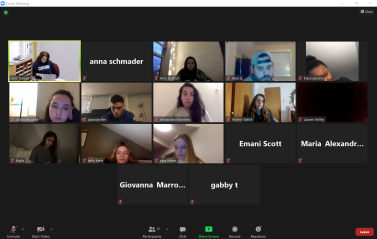When the camera is on, the laughs are off. The pressure for humor in the online learning setting has been a meticulous subject. Teachers find it difficult to keep students engaged while students are muted and have their cameras off.

“Humor is a big part of the classroom,” Lexi Chiarlone, freshman elementary and special education major, said. “It can allow kids and the teacher to have a better relationship and the kids will most likely learn more from them because they have a stronger bond.”
There have been indications of increased learning, self-motivation and class attendance when teachers use humor. Students already expect classes to be dull and dry so making your class laugh can lighten the mood.
When the teacher stops talking, there is no talk, no side conversations, no real engagement. There are groups that are silent when they meet in a room because students don’t know each other.
Chiarlone is one of the few students who tries to keep the classroom engaged. She knows students have to adapt to what we are given, AKA Zoom, BlackBoard and Microsoft Teams, since we don’t know how much longer we will be like this.
Now with the choice to not show their face, students choose to shut themselves out of any discussion. For Chiarlone, she keeps her camera on out of respect for the teacher. If there are distractions near her, she keeps it off.
“There is no real conversation going on between the students anymore,” Chiarlone said. “The conversation aspect of school has been dry.” With every in-person classroom setting, there was this invisible invitation for humor that is now gone.

For Nick Booth, junior marketing major, he feels humor hasn’t completely diminished but it is more difficult in an online setting. When there’s no direct human connection, it’s hard to make somebody laugh.
“I think the experience as a whole is extremely dry,” Booth said. “It’s very difficult to pay attention when you’re online.”
He mentioned messing around a little and being able to joke with your teachers and classmates can provide a grasp to keep students paying attention. Most times, these kids are playing on their phones. There are some teachers that he has who try to joke around making the experience a little better, but a majority of them just lecture making it feel like a long monologue.
“I 100 percent do think [humor] is important in any setting because it’s a way to keep a class engaged,” Booth said.
He’s included with the few students who keep their cameras on since it helps him stay focused on the class rather than the external distractions.
For Jana Tidwell, communication professor, she understands students are under immense stress levels. Transitioning from adolescence to adulthood, taking on more responsibilities, figuring out your destiny, your education and ultimately employment are stressful.
“Layer on top of that a global pandemic then on top of that the political climate that is our country right now,” Tidwell said. “And on top of that, race relations issues.”
It’s all a lot of pressure to be under. She mentioned the feeling of admitting to stress being perceived as failure. She explained that once people start talking more about what they’ve been feeling, you can relate to their experience because they’re in a similar position.
“You’re not alone, you’re not the only one struggling, you’re not the only one feeling this way, experiencing these challenges,” Tidwell said. Having that outlet to be able to talk and debrief about what’s happening presently is a feeling of relief, that someone is listening.
Tidwell mentioned that being serious all the time is ignoring the elephant in the room. To open a safe and comforting environment for your students will give them that gateway to talk about right now. Tidwell does a weekly pulse check with her students to check-in and asks how they’re feeling. Even doing something out of the ordinary like bringing in a guest speaker who’s engaging or bringing in shamrock shakes for the class.


